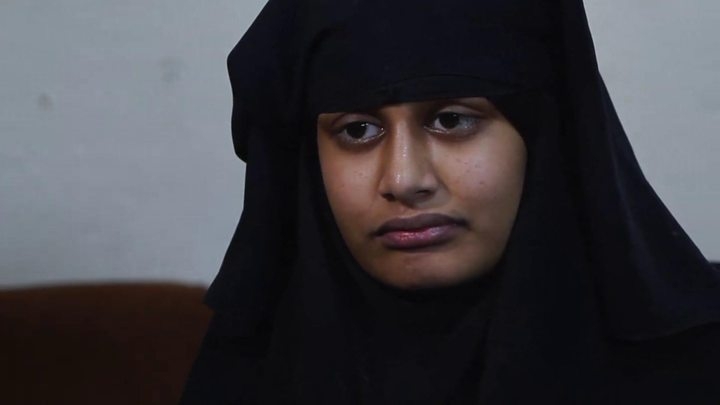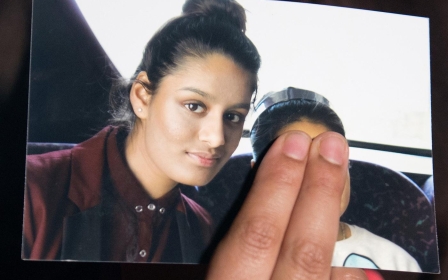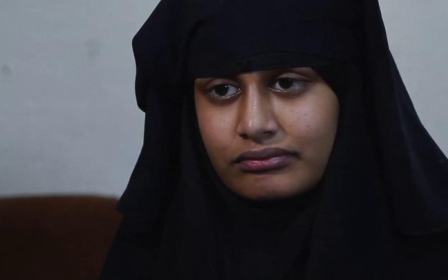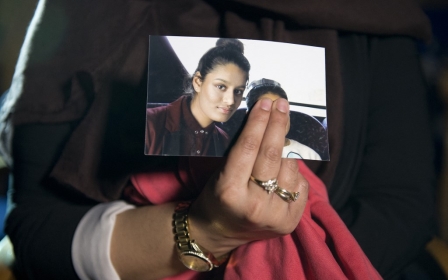Shamima Begum: Citizenship-stripping of Muslims reflects security threat, court told

The UK government has defended its decision to strip Shamima Begum of her British citizenship, telling a court on Thursday that it did not accept that her case had damaged the country’s Muslim community.
Lawyers for the Home Office told an immigration court hearing Begum’s appeal against the loss of her citizenship that the fact the controversial powers had been used primarily against Muslims reflected the threat of “Islamist terrorism”.
Begum, who left the UK in 2015 aged 15 to travel to Syrian territory then controlled by the Islamic State group, is currently detained in a camp in northeastern Syria and unable to return to the UK.
Gareth Peirce, Begum's solicitor, said in written submissions given to the court that "almost all [citizenship-stripping cases] involve British Muslims and the significant majority are of South Asian, Middle Eastern or African descent."
But James Eadie, representing the Home Office, quoted a Home Office official who told the court that deprivations reflected "that Islamist terrorism has in that same period been the source of a significant threat" to UK national security.
New MEE newsletter: Jerusalem Dispatch
Sign up to get the latest insights and analysis on Israel-Palestine, alongside Turkey Unpacked and other MEE newsletters
"It's suggested that there is a disproportionate impact on British Muslims, but the example given didn't bear that out... [the] potential impact on communities was well-known and considered," said Eadie.
Eadie's remarks came on the fourth day of hearings in which Begum’s lawyers have accused the UK government of creating a two-tier citizenship system, based on its use of deprivation orders against people deemed to be dual nationals.
Begum was stripped of her citizenship in 2019 after being found in a camp in northeastern Syria for the families of suspected IS fighters and people fleeing IS territory as western-backed Kurdish-led forces defeated the militant group.
She has remained detained in Syria ever since. She gave birth to a child in the camp, but the baby died weeks later. Begum has said she had two other children in Syria who also died.
The British government argues that Begum, born in the UK, is entitled to Bangladeshi citizenship through her parents. But, Bangladeshi authorities have rejected claims she is a Bangladeshi national.
Earlier on Wednesday, Dan Squires, representing Begum, told the court that she could face the death penalty if sent to Bangladesh and had been left effectively stateless.
Home Office documents shared with the court showed that Begum's "de-jure statelessness" was confirmed only the day before her citizenship was revoked.
"There is nothing in any of the home secretary's evidence which suggests that consideration was given - before the deprivation decision being taken, or indeed at any time - to matters relating to de facto citizenship," said Squires.
"The Bangladesh authorities would have confirmed that the appellant would be hanged if she entered the country."
The government pushed back on this claim and said asking Bangladesh for permission to deprive Begum of her citizenship would have "serious consequences" for Britain's deprivation process.
Eadie said that suggesting that the British government should “seek the views of foreign governments” before deciding whether to deprive a national of citizenship “would likely render the entire deprivation regime inoperable”.
This week’s hearing at the Special Immigration Appeals Commission (SIAD) is the latest stage of an ongoing legal battle that has already seen details of Begum’s case considered in the Court of Appeal and the Supreme Court.
The final day of the hearing on Friday is expected to take place in closed court.
Middle East Eye delivers independent and unrivalled coverage and analysis of the Middle East, North Africa and beyond. To learn more about republishing this content and the associated fees, please fill out this form. More about MEE can be found here.




